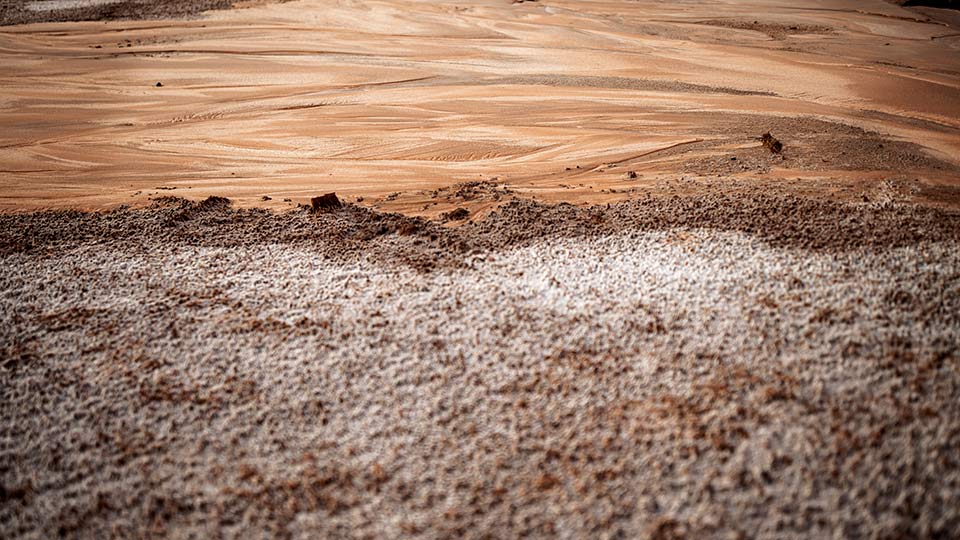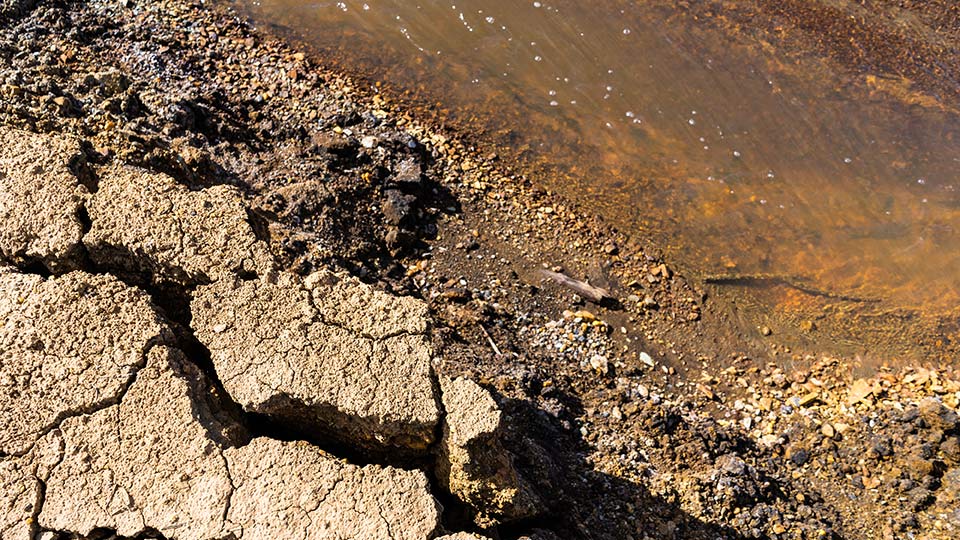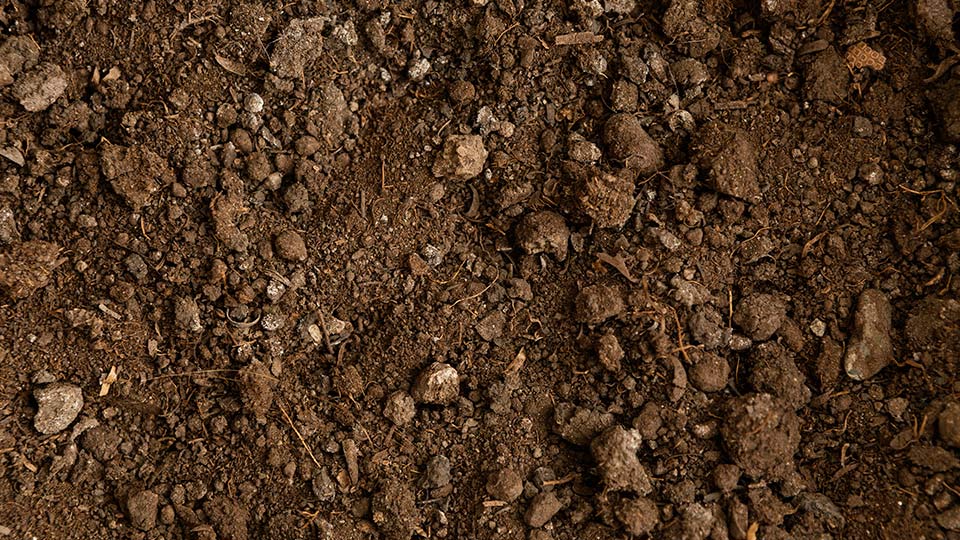
Soil is a product of the action of pedogenetic processes that are conditioned by the continuous, joint and interdependent action of heterogeneous pedogenetic factors. From the pedogenetic factors we would mention:
- relief with different altitude, exposure and inclination, hydrographic conditions,
- geological formations of different age and composition,
- the presence of multiple climates, as
- different plant associations.
Due to the long-term effect of pedogenetic factors, our soils have changed over time, so that they have reached a different level of evolution. To this should be added the long-term human action that has changed the direction of natural pedogenetic processes in many of our soils. In the space of our country, there is great heterogeneity of the soil cover. It is highly mosaic, meaning it changes over small distances. In the Republic of Macedonia there are slightly more than 30 soil types and even more subtypes, varieties and forms.
Soil is a very dynamic system that performs many functions and provides services important for human activities and the survival of ecosystems. The soil has numerous ecological functions, which are essential for the protection of the environment, but also for the economy and the progress of society as a whole.
- The soil provides us with food, biomass and other raw materials.
- It is a platform for human activities and an archive of geological and archaeological heritage.
- It also plays a central role as a habitat and depot of genes of living organisms.
- Soil stores, filters and transforms many substances, including water, nutrients and carbon.
- In the soil is the largest depot of carbon in the world (1,500 gigatons).
Soil is an extremely complex and variable medium. Soil structure plays a significant role in determining its ability to perform its functions. Any damage to the soil structure also damages other environmental media and ecosystems.
The soil is subject to serious degradation. These include erosion, reduction of organic matter, local and diffuse contamination, imprinting, reduction of biodiversity, salinization, flooding, etc. In combination, all these degradations can lead, in arid and subarid climatic conditions, to desertification.
The impact on the soil caused by human activities is constantly increasing, which causes serious socio-economic consequences.
The need for soil protection and integrated soil management are outlined in The Second National Environmental Action Plan of the Republic of Macedonia 2006.
The Republic of Macedonia ratified it in 2002. United Nations Convention to Combat Desertification, Especially in Countries Facing Severe Droughts - United Nation Convention to Combat Desertification (UNCCD).
The Kyoto Protocol indicates that soil is a major carbon store that should be protected and increased if possible. Carbon sequestration in agricultural soils with certain management practices can contribute to reducing climate change. The Republic of Macedonia ratified the United Nations Framework Convention on Climate Change - United Nations Framework Convention on Climate Change (UNFCCC) in 1997 and ratified the Kyoto Protocol in 2004.
Convention on Biological Diversity – Convention on Biological Diversity (UNCBD) , The Republic of Macedonia ratified it in 1997.
Почва - Заштита на почвата



Почва - Регулатива
Заштитата на почвите во Република Македонија се регулира со неколку закони:
- Законот за животната средина
- Законот за заштита на природата
- Законот за земјоделско земјиште (Сл. Весник бр. 135/07)
- Законот за шуми (Сл. Весник на Р.М. бр. 47/97, 2/00, 89/04, 54/07, 103/08)
- Закон за изменување и дополнување на законот за шумите (Сл. Весник бр.54/07 од 03.05.2007)
- Закон за измени на законот за шуми (Сл. Весник бр.07/2000 од 01.02.2000)
- Законот за просторно и урбанистичко планирање (Сл. Весник 52/05)
Почва - Упатства
Почва - Решенија
Почва - Обрасци
Почва - Регистри
Почва - Дозволи
Soil erosion
Soil erosion is a process of soil degradation and its behavior in the lower parts of the watershed. According to the cause, erosion is divided into:
- Water erosion - caused by rain, runoff, glaciers and groundwater
- Aeolian erosion-caused by wind
- Abrasive erosion-caused by the combined action of wind and water
In our country, water erosion is dominant, namely the erosion caused by rain and runoff. Aeolian erosion occurs in our country on high mountain peaks, but the damage from it is negligibly small compared to water erosion. The same is the case with abrasive erosion which is actually caused by lake waves in our country.
Macedonia is one of the territories most threatened by erosion in the Balkans. There are several reasons for that:
- long-term destructive influence of man (destruction of natural vegetation, absence of measures for the conservation of agricultural soils, improper processing with deterioration of the physical properties of the soil)
- relief in which mountains and valleys alternate with the appearance of steep and long slopes
- erodibility of some sediments, rocks and soils
- climatic conditions such as torrential rainfall, aridity of the climate due to which the natural vegetation covers the soil more poorly, and the destroyed vegetation is more difficult to restore.
Local and diffuse contamination
Soil contamination from solid waste from mines, metallurgical and other industrial facilities
One of the methods of exploitation of coal, copper and nickel ore is open pits. The greatest damage occurs during the exploitation of coal for energy purposes, because it occurs in our valleys under fertile soils and under deep layers of loose sediments. Solid waste from mines where Fe, Zn, Pb, Cr, Ni, Cu, etc. are extracted contains heavy metals and is processed by flotation.
Metallurgical waste in the Republic of Macedonia is created in smelters during the production of iron, steel and alloys, lead and zinc, ferronickel, ferrochrome, ferrosilicon and silicon metal. This waste with its mass covers a certain area of the productive land, reducing the land fund. The large amount of heavy metals is the result of the application of technology that incompletely exploits the ore.
Solid waste from industry has a similar effect on water and soil as well as waste from metallurgy. With its mass, it covers small areas of productive land, but therefore causes strong contamination. It contaminates not only with heavy metals, but also with other substances, for example organic.
Covering the soil with solid municipal waste
Municipal waste has a very heterogeneous composition and is a consequence of human activity. It is deposited at certain landfills, but also at so-called wild landfills in rural areas and all over the Republic.
Soil contamination in agriculture and forestry
Regarding the use of fertilizers in agriculture, it should be emphasized that in order for fertilizers to degrade the soil, it it should be used in excessively large quantities and, what is very important, its constituent soluble parts should increase the concentration of the soil solution. Nitrates are the main contaminants among mineral fertilizers.
Pesticides are mineral, organomineral and organic chemical compounds that are used in agriculture to destroy harmful organisms (weeds, insects, fungi, bacteria, etc.) The main disadvantages of pesticides are the long persistence of some in the components of the biosphere, they can destroy or damage beneficial organisms and migrate out of the agroecosystem. Those that do not decompose and accumulate in the soil are especially dangerous.
106 reclamation systems and about 20 larger reservoirs have been built in Macedonia. An irrigation network of 140,000 ha has been built, optimally 126,000 ha can be irrigated, but in reality various areas in the size of 80,000 ha are irrigated. Most of the areas that are irrigated with water from artificial reservoirs are located in the upper reaches of the rivers above the sources of pollution, with the exception of the Tikvesh and Kalimanci reservoirs. The most polluted (especially with heavy metals) are the waters used in the mines (Zletovo, Sasa, Toranica) in the flotation processes. Soils irrigated with river waters enriched with those effluents are polluted with heavy metals, especially lead and zinc.
Soil contamination through other environmental components
There is indirect soil contamination. This means that the air and water are contaminated first, and the soils only indirectly through those components. Pollutants emitted into the air reach the soil through rain and precipitation. Pollutants from water reach the soil through flooding, irrigation or by capillary action.
Pollution in cities is diffuse, ie. a large number of different pollutants participate in it: city heating plants, individual hearths, boiler houses, traffic, metallurgical and industrial facilities. Suspended particles from the air with deposition and precipitation reach the surface of the soils and plants in the city.
The productive fund of the land in our country is also reduced by conversion of land use, for example for water reservoirs, for the construction of settlements and industrial facilities and for the construction of various infrastructure facilities. Soil imprinting can also have an impact on the fragmentation of habitats and interruption of migration corridors of wild animal species.
In the Republic of Macedonia, the CORINE Land Cover project started at the end of 1998, and the verification of the final product was carried out in February 2000. Due to the characteristics of the land cover on the territory of R. Macedonia, out of 44 possible classifications, 31 have been identified in Macedonia. Additionally, for the same reasons, the minimum spatial unit that is cultivated in the project, instead of 25 hectares, has been reduced to 20 hectares. The CORINE Land Cover database contains valuable information that, in correlation with other data, can be an instrument for solving:
- the protection of high-quality arable land from the effects of urban development, especially around cities;
- uneven regional development;
- problems related to land erosion in certain areas;
- problems related to nature protection.
To obtain a more comprehensive picture, the percentage representation in R. was calculated for each classification. Macedonia is represented graphically as well. The CORINE Land Cover database was created only once ie. there is information only about the state of the land cover in R. Macedonia, obtained as a result of processing the satellite images. From this it follows that it is not possible to gain insight into the changes of the land cover in R. on the basis of these data. Macedonia that are expected to occur in a certain period of time.
Artificial surfaces in the Republic of Macedonia cover an area of 1.45% of the entire surface of the Republic. Of all the classes, the non-permanent urban structure is the most represented, followed by industrial or commercial units, then mineral deposits.
Agricultural areas cover 36.58% of the total area of the Republic of Macedonia. Of these, the largest representation is arable land that is not irrigated, followed by models of complex cultivation, then pastures.
Forests and semi-natural areas occupy 59.65% of the total area of R. Macedonia. The most represented class of this category is the broad-leaved forest, followed by the transit forest land with shrubs, then the natural meadow.
Terrestrial wetlands occupy area of 0.07% of the area of R. Macedonia. Water bodies occupy 2.19%.
Generally speaking, the population in Macedonia is increasing in the western and southwestern parts, and decreasing in the eastern parts of the country, as a result of natural population growth and migrations. 87% of the population is concentrated in larger cities. In the main city of Skopje, about a quarter of the inhabitants of R. Macedonia. Then the migration is focused around bigger cities like Kumanovo, Tetovo. Gostivar, Ohrid Strumica and Veles. As a result of the above, most cities have problems with water supply and solid waste management, as well as air pollution from the transport sector and industrial plants.
Reduction of organic matter
It is considered that 95% of the territory of Macedonia was under forests, and only a small part under natural grass vegetation, before the anthropogenic destruction and degradation of natural vegetation and conversion of natural soils into agricultural ones began. Only a little over 1/3 of the natural forests are preserved. Half of the destroyed forests have been turned into pastures, and half into arable land, and large areas under trees (337,000 ha) have also been obtained. A significant component in this type of soil degradation is the reduction of plant waste, humus and biogenic elements and the reduction of the natural fertility of the soil.
The content of humus and biogenic elements decreases much more slowly in the soils that were previously under herbaceous vegetation compared to the soils that were under forest communities. Reduction of humus by destruction of meadow and swamp vegetation in Pelagonia, one of the largest lowlands in Macedonia, which is used for the cultivation of various agricultural crops, amounts to: humus content in meadow soil before plowing 3.98%, after plowing 3.43%, and in swampy soils 6.32% and 5 ,29%. This means that in 20 years about 15% of the total amount of humus has been lost. In Pelagonia, 0.75% of the total amount of humus is lost annually, which means that the biological degradation is weak, i.e. less than 1%. In Macedonia, the average content of humus in certain types of soils is as follows: mountain ranges 11.3%, smolniki 4.17-4.68%, brown forest soils 4.6%, alluvial soils 2.9-3.9% .
Salinization
The term saline soils is mainly retained as a common term for alluvial soils (soils characterized by additional wetting with underground, and less often with surface saline and alkalized waters and up to a depth of 125 cm at least in one part of the profile contain at least 1% salts at chloride-sulfate salinization or 0.7% salts in sodium salinization and adsorbed Na-ions above 5%) and brackish soils (the intensity of salinization and alkalization is weaker than brackish soils), although that term is not entirely adequate. In fact, these are sodium soils, because sodium is the main element that participates in the genesis of these soils either in the form of salts or in the form of adsorbed ions. Salty or salted soils in our country are denoted by several popular names such as: salted earth, solenica, slatina, belokalica, celak, hard, etc.
The areas of saline soils in our country are small, they amount to only 0.42% of the total area of our country. These soils are formed mainly in our flat terrains which amount to only 7.9%. Then in a large part of our country the climate is not arid, there are no sediments with salts and there is no saline underground water. An exception is Pelagonia due to the specific hydrographic conditions. The most saline soils are found in the central and eastern part of Macedonia, i.e. in a continental-sub-Mediterranean area that is distinguished by the most pronounced aridity and strong evaporation, with the presence of Paleogene sediments, among which there are also saline ones, and with the presence of shallow mineralized groundwater. It is characteristic that 90% of all areas of saline soils occur in only 4 valleys (Strumicka, Skopska, Ovche Pole and Pelagonia). In Macedonia, there are about 11,000 ha under salt marshes and marshy soils. There are 3,200 ha under salt marshes, which means that marshy soils dominate. These soils have a natural origin, but the anthropogenic factor plays a significant direct and indirect role in their genesis.
Salinization occurs under certain conditions: in the negative forms of the relief, under the influence of capillary ascent and evaporation of shallow and salty groundwater, in areas with arid and semiarid continental-submediterranean climate with strong evapotranspiration. Main sources of salts are the saline Paleogene sediments and chemical decomposition.
Human influence on the genesis and properties of these soils can be indirect and direct. Indirect influence consists in the fact that man can change the pedogenetic factors (hydrographic conditions, vegetation), and through them the soils. Anthropogenic salinization occurs if irrigation is done with salty water or if the level of underground mineralized water is raised when high-quality river water is used for irrigation, but in larger quantities than necessary and in poorly drained conditions.
Flooding
Soil can also be contaminated by contaminated surface and groundwater if it comes into contact with the soil in any way.
With the performed drainage, ie. with flood protection covering an area of nearly 70,000 ha, contaminated river waters cannot come into contact with the soil through flooding. The exception to this are a few hot spots, the soils along the rivers that carry polluted waste water from the mines in eastern Macedonia. The soil surfaces along the rivers Zletovska Reka, Kamenicka Reka, Toranicka Reka are not protected from floods.
